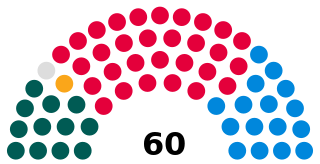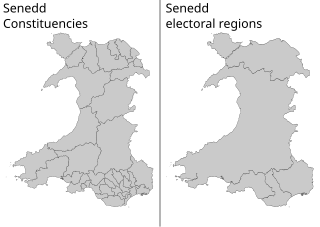See also
- Wales Act, several pieces of legislation
- Northern Ireland Act, several pieces of legislation
- Scotland Act (disambiguation)
There have been two Government of Wales acts of the UK Parliament:

This is a list of local government areas (LGAs) in New South Wales, sorted by region. As of January 2023 there were 128 local government areas in New South Wales, there are 33 local government areas in Greater Sydney and 95 local government areas and 12 regions in Regional NSW. All councils are listed below in alphabetical order by region. There is also the Unincorporated Far West Region which is not part of any local government area, in the sparsely inhabited Far West, and Lord Howe Island, which is also unincorporated but self-governed by the Lord Howe Island Board.

A statutory instrument (SI) is the principal form in which delegated legislation is made in Great Britain.

The Senedd, officially known as the Welsh Parliament in English and Senedd Cymru in Welsh, is the devolved, unicameral legislature of Wales. A democratically elected body, it makes laws for Wales, agrees to certain taxes, and scrutinises the Welsh Government. It is a bilingual institution, with both Welsh and English being the official languages of its business. From its creation in May 1999 until May 2020, the Senedd was officially known as the National Assembly for Wales and was often simply called the Welsh Assembly.

The Scotland Act 1998 is an Act of the Parliament of the United Kingdom which legislated for the establishment of the devolved Scottish Parliament with tax varying powers and the Scottish Government. It was one of the most significant constitutional pieces of legislation to be passed by the UK Parliament between the passing of the European Communities Act in 1972 and the European Union (Withdrawal) Act in 2018 and is the most significant piece of legislation to affect Scotland since the Acts of Union in 1707 which ratified the Treaty of Union and led to the disbandment of the Parliament of Scotland.
In the United Kingdom, the boundary commissions are non-departmental public bodies responsible for determining the boundaries of parliamentary constituencies for elections to the House of Commons. There are four boundary commissions: one each for England, Scotland, Wales and Northern Ireland.

Referendums in the United Kingdom are occasionally held at a national, regional or local level. Historically, national referendums are rare due to the long-standing principle of parliamentary sovereignty. There is no constitutional requirement to hold a national referendum for any purpose or on any issue however the UK Parliament is free to legislate through an Act of Parliament for a referendum to be held on any question at any time.
Equality generally refers to the fact of being equal, of having the same value. In specific contexts, equality may refer to:
A pastoral lease, sometimes called a pastoral run, is an arrangement used in both Australia and New Zealand where government-owned Crown land is leased out to graziers for the purpose of livestock grazing on rangelands.

The Welsh Church Act 1914 is an Act of Parliament under which the Church of England was separated and disestablished in Wales and Monmouthshire, leading to the creation of the Church in Wales. The Act had long been demanded by the Nonconformist community in Wales, which composed the majority of the population and which resented paying taxes to the Church of England. It was sponsored by the Liberal Party and opposed by the Conservative Party.
The Constitution Act or Constitutional Act is the name of several acts, notably:

In the United Kingdom, devolved matters are the areas of public policy where the Parliament of the United Kingdom has devolved its legislative power to the national legislatures of Scotland, Wales and Northern Ireland, while reserved matters and excepted matters are the areas where the UK Parliament retains exclusive power to legislate.

The Municipal Corporations Act 1882 is an act of the Parliament of the United Kingdom. It replaced existing legislation governing municipal boroughs in England and Wales, and gave the corporations powers to make bylaws and to acquire land and buildings. Municipal boroughs continued to be regulated by the Act until their abolition in 1974. Parts of the Act are still in operation. Sections 190 to 194 were amongst the enactments cited as the Police Acts 1839 to 1893.

The Government of Wales Act 2006 is an act of the Parliament of the United Kingdom that reformed the then-National Assembly for Wales and allows further powers to be granted to it more easily. The Act creates a system of government with a separate executive drawn from and accountable to the legislature. It is part of a series of laws legislating Welsh devolution.

The states and territories are the second level of government of Australia. The states are administrative divisions that are self-governing polities that are partly sovereign, having ceded some sovereign rights to the federal government. They have their own constitutions, legislatures, executive governments, judiciaries and law enforcement agencies that administer and deliver public policies and programs. Territories can be autonomous and administer local policies and programs much like the states in practice, but are still legally subordinate to the federal government.

The Senedd constituencies and electoral regions are the electoral districts used to elect members of the Senedd to the Senedd, and have been used in some form since the first election of the then National Assembly for Wales in 1999. New boundaries were introduced for the 2007 elections and currently consist of forty constituencies and five regions. The five electoral regions are: Mid and West Wales, North Wales, South Wales Central, South Wales East, and South Wales West, with the forty constituencies listed below. Voting last took place in all districts in the 2021 Senedd election, and is not used for local government.

A Measure of the National Assembly for Wales is primary legislation in Wales that is a category lower than an Act of Parliament. In the case of contemporary Welsh law, the difference with Acts is that the competence to pass Measures is subject to 'LCOs' or Legislative Competence Order, which transfers powers to the Assembly by amending Schedule 5 of the Government of Wales Act 2006.
Succession to the Crown Bill may refer to the following pieces of legislation introduced in the United Kingdom:
Lobbying Act can refer to several pieces of legislation governing the lobbying of government:
Shops Bill or Shops Act may refer to several pieces of legislation in the United Kingdom:
The Anti-Terrorism Act is the short title of several pieces of anti-terrorism legislation and may refer to: